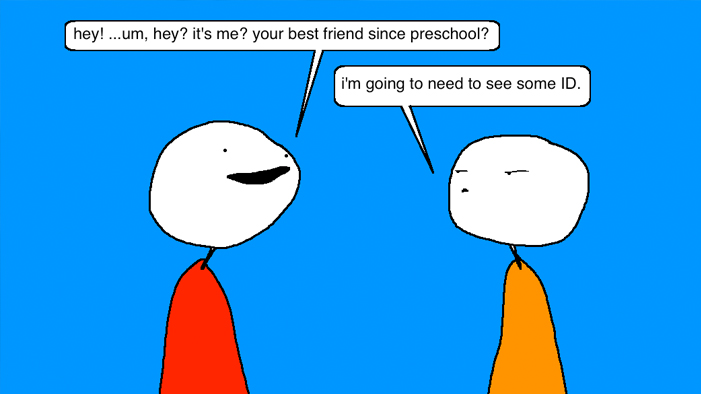Auntie SparkNotes: Am I Too Trusting?

Dear Auntie,
I am going to be a college freshman this fall, and I am rather naïve when it comes to…well, lots of things. Particularly related to how much I trust people. I tend to assume the best in people, which hasn’t been a SERIOUS problem throughout high school, but I have a feeling this characteristic of mine could get me into trouble in college.
How do I know if people’s intentions are right or that they don’t have ulterior motives…before it’s too late? (This could be in any context from friendship, to relationships, or other.) How can I tell when someone is lying? How can I tell when someone is being malicious and insincere? How can I tell if I can trust someone? I feel I am too gullible and oblivious; multiple times I have believed a person was being honest with me right off the bat, only to find out months later that they were being untruthful this whole time, causing me much embarrassment (but luckily, no harm. Yet).
Well, there’s your problem, Sparkler! Where on earth did you get the idea that being duped by a dishonest person is something to be embarrassed about? The only person who should be embarrassed in that scenario is the one who flouted the basic human covenant against being a lying, malicious asshat. Assuming the best of people is not a problem, or a character flaw; it’s normal, it’s healthy, and most importantly, it’s a vital aspect of the social contract that keeps us all in peaceful coexistence with each other and which we need to continue to abide by unless we want the social terrorists to win. Being taken in by a liar doesn’t mean there’s something wrong with you. It’s the person who takes advantage of your trust who needs to fix himself.
All of which is to say, you should continue to assume the best of people, until you have a good reason not to — and trust that the people who don’t deserve your trust will reveal themselves as such in due time. You don’t need special radar or a suspicious disposition to detect the presence of a malicious, insincere person in your life; you just need eyes and ears. With the exception of actual psychopaths (who walk among us to the tune of about 1% of the overall population), the jerks of the world are not stealthy. They talk trash about friends behind their backs; they blab about things someone else told them in confidence; they treat cashiers and waiters and animals poorly; they’re petty, selfish, self-aggrandizing, and sleazy. And if one of these people stumbles into your orbit, you’ll figure it out soon enough just by observing them in action.
Meanwhile, it’s true that there’s a difference between maintaining a basic level of faith in humanity and being a credulous idiot—but that’s the difference between giving someone the benefit of the doubt that they’re not a monster versus giving them your social security number and the keys to your house before you’ve confirmed as much (which I assume you know not to do already, but if not, y’know, don’t do that).
And look: as an incoming college freshman without a whole lot of life mileage, maybe you are a bit naive, or even gullible—but as an incoming college freshman, you’re allowed, and more importantly, you won’t stay that way. Life experience is the greatest cure for gullibility there is, and the next several years will be full of nice, low-stakes opportunities for you to learn how to temper any overly trusting tendencies with a little healthy skepticism. And while not all of those learning experiences will be pleasant, none of them will see you come to any actual harm, which is an important lesson in and of itself. Mostly, you will learn that people deserve the benefit of the doubt—but when they don’t, you’ll learn to be confident in your ability to tangle with a jerk and live to tell the tale.
Got something to say? Tell us in the comments! And to get advice from Auntie, email her at advice@sparknotes.com.
Want more info about how this column works? Check out the Auntie SparkNotes FAQ.












